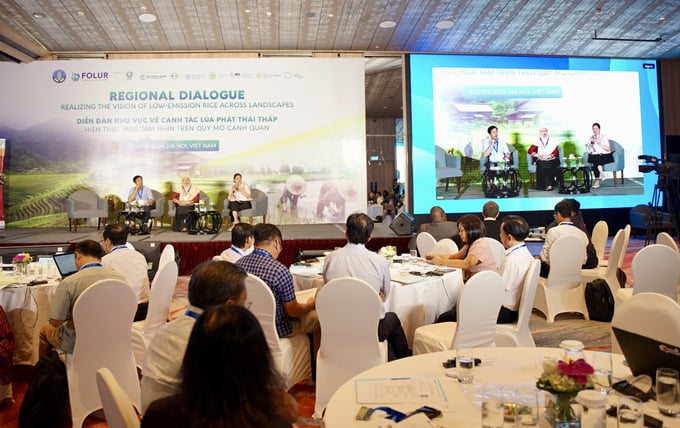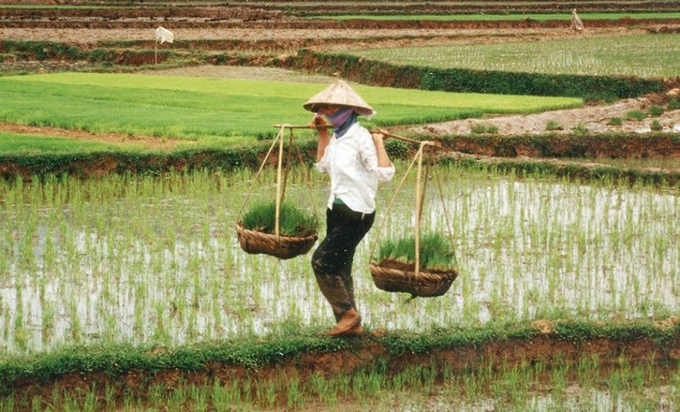November 24, 2025 | 13:07 GMT +7
November 24, 2025 | 13:07 GMT +7
Hotline: 0913.378.918
November 24, 2025 | 13:07 GMT +7
Hotline: 0913.378.918

Regional Dialogue of MARD and FOLUR Impact Program 'Realizing the vision of low-emission rice across landscapes' on September 9. Photo: Linh Linh.
Sharing lessons learned and recommendations for enhancing gender empowerment in rice cultivation, Ms. Ranjitha Puskur (International Rice Research Institute), a leading expert on gender and social inclusion in agricultural systems and rice farming systems, highlighted the importance of women in these production systems. She emphasized that their roles, although crucial, often go unpaid and unrecognized in rice production.
Women also make significant contributions to the value chain, from production to post-harvest processing and other stages. They contribute to food security, nutrition, health outcomes, and family well-being, as well as on higher levels.
Numerous research studies have shown that empowering women improves all these outcomes. The big question for us is how to empower farmers in rice cultivation systems, especially women, who have specific needs and preferences for developing agricultural techniques, such as rice cultivation methods, that differ from men. This involves considering their needs and capacities, such as their ability to cope with stress, their need for higher nutritional intake, and their need for better rice varieties with higher yields.
This will help them achieve better outcomes and contribute to our sustainable development goals. Poor women rice farmers are often the most affected by climate shocks and other weather events. Therefore, she called for joint collaboration to develop technological solutions and strategies to help women cope with these pressures through IRRI's projects with women farmers.
One focus of the The Food Systems, Land Use, and Restoration (FOLUR) is labor-saving technologies to reduce workforce demand, particularly in tasks related to planting, caring for, and harvesting rice. These technologies, along with mechanization processes and supportive equipment—such as harvesting machines, threshers, and rice milling facilities—reduce the workload pressure on women, mitigate health risks, and provide them with more time. These are the benefits of labor-saving technologies. Nowadays, it is encouraged to plant rice directly in the field instead of transplanting seedlings, which is one of the solutions being discussed.
Furthermore, she shared that there's need suitable equipment when women apply fertilizers and pesticides in their fields. These are factors we must consider. We need to be mindful of trade-offs in all aspects of rice farming. We also understand that we must go beyond technology and embrace collective action.
Supporting women's groups, producer organizations, cooperatives, and farmer groups is a critical factor in ensuring their inclusion in our programs, activities, and projects. This also increases the value of goods and promotes mechanization.
In recent years, the focus on women's roles in agricultural systems, particularly in rice production, has gained significant attention. The Food General Agency’s project, designed to promote gender inclusivity and sustainability, offers valuable insights into how women can be empowered in various stages of rice cultivation and marketing. Dr. Nguyen Linh, a key figure in the project, outlines the multi-faceted approach of this initiative and sheds light on the challenges and opportunities women face in these environments.

While women have traditionally been involved in production, there has been a notable shift, with more women now participating in marketing and other stages beyond the farm. Photo: Mekong Institute.
The project is based on four primary components aimed at liberating and enabling sustainable rice production environments. These components emphasize the importance of including women throughout the entire rice value chain. While women have traditionally been involved in production, there has been a notable shift, with more women now participating in marketing and other stages beyond the farm.
The project highlights the critical role of technology in creating sustainable systems. Dr. Linh explains that the aim is to move towards large-scale, sustainable rice production that secures stable incomes and environmental stability for the workforce. This includes labor-saving technologies that reduce the physical burden on women in farming activities. Equipment such as threshers, rice milling facilities, and digital platforms for monitoring prices have been introduced to streamline the farming process and make it more efficient, particularly for women.
One of the concerns raised during the discussion was the low representation of women in extension services in some regions. While Vietnam doesn't face significant challenges in this area, it was noted that women in rural areas play essential roles in farming activities. The skill and knowledge of extension workers, whether male or female, are crucial for providing support to all farmers. Women extension workers may have a unique advantage when working with female farmers, particularly in cases where women are the heads of households.
A critical issue addressed in the project is how to ensure women's participation in training and decision-making processes. In the five districts where the project is active, there is a focus on reaching out to women farmers and encouraging them to participate in training programs. Women are not only involved in production but also in post-harvest activities, marketing, and retail. By ensuring that training sessions are tailored to their needs, the project aims to provide women with the knowledge and skills to enhance their productivity and management abilities.
Despite the progress made, challenges remain. Simply earning more income does not necessarily elevate women’s roles within their families or communities. True empowerment lies in improving their control over resources and increasing their participation in decision-making processes. The project continues to explore ways to improve women's access to resources and ensure their voices are heard in all aspects of rice production.
The project’s multi-pronged approach recognizes that achieving gender equality in agriculture is a long-term process. By integrating women into all stages of rice production, from farming to marketing, and addressing their unique needs, this initiative aims to create a more inclusive and sustainable agricultural system. Empowering women not only enhances their livelihoods but also contributes to broader societal transformation, ensuring a more equitable future for all.

(VAN) Trieu Son commune deploys a 'virtual assistant' to help residents complete administrative procedures.

(VAN) Applying green technology in rural water supply and sanitation helps improve resource efficiency, protect the environment, and enhance community living standards.

(VAN) Developing biosecure livestock production is the key that helps Tuyen Quang form linked chains in livestock production and build its brand in the market.

(VAN) During his bilateral activities in South Africa, Prime Minister Pham Minh Chinh welcomed Vice President of the South African Chamber of Commerce and Industry Neil Pollock.

(VAN) Prof. Dr. Hoang Van Cuong, National Assembly Deputy of the 14th and 15th terms, shares recent pioneering policy decisions.

(VAN) Deputy Minister Tran Thanh Nam directed a comprehensive reform of the agricultural extension system, emphasizing professionalism and connecting farmers with the market.
/2025/11/22/3633-1-072521_760.jpg)
(VAN) The signing ceremony took place under the witness of Prime Minister Pham Minh Chinh and President of the Republic of South Africa Cyril Ramaphosa.